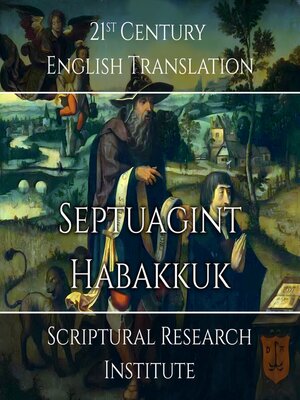
Sign up to save your library
With an OverDrive account, you can save your favorite libraries for at-a-glance information about availability. Find out more about OverDrive accounts.
Find this title in Libby, the library reading app by OverDrive.



Search for a digital library with this title
Title found at these libraries:
| Library Name | Distance |
|---|---|
| Loading... |
Most scholars accept that Habakkuk was written by a prophet called Habakkuk sometime during the Neo-Babylonian Era, or earlier during the late Neo-Assyrian era when the Babylonians were in revolt. Given that the rebels were not the ancient Chaldeans, but a branch of the Assyrian royal family, it seems unlikely that anyone would have referred to the rebels as Chaldeans. After the Assyrian empire had fallen, the rebel royal family in Babylon embraced the ancient Chaldean identity in order to cement their control over Babylonia, following which the remnants of the Assyrians in Babylonia were referred to as Chaldeans.The Book of Habakkuk is considered unique among the books of the bible, as Habakkuk openly questions his Lord's actions, which in the Masoretic version of the book, means he is questioning God. In the Septuagint's version, his Lord was not necessarily God, as Habakkuk was either a polytheist or someone speaking to polytheists. As Habakkuk must have lived while the Chaldeans were around, he either lived before Abraham, when the original Chaldean people ruled Babylon, or during the Neo-Babylonian Empire, sometime between 626 and 539 BC. There is nothing in the book of Habakkuk that indicates he lived in the 3ʳᵈ millennium BC, and his mentioning of the Kushites and Arabs is consistent with the political geography of the Neo-Babylonian Empire, when the Kingdom of Kush was backing the Egyptians against the Babylonians, and the Babylonians were trying to conquer the Arabs.Habakkuk's writing describes the Neo-Babylonians riding out and conquering the world, which was a description of the Neo-Babylonian Empire during King Nabopolassar's reign, between 626 and 605 BC, and during the reign of his son Nebuchadnezzar II, between 605 and 562 BC. After Nebuchadnezzar II's reign, the nobles of the Neo-Babylonian empire turned on each other, the self-declared "Chaldean" Dynasty lost power, and the empire slowly became weaker until Cyrus II of Persia conquered them in 539 BC. If the Babylonian Empire was rapidly expanding in Habakkuk's time, then he had to have been prophesying between 626 and 562 BC, and yet his prophecy is not consistent with the religious reforms of King Josiah, who, beginning circa 632 BC, banned the worship of all gods in Judah, other than his version of Yhủh.







